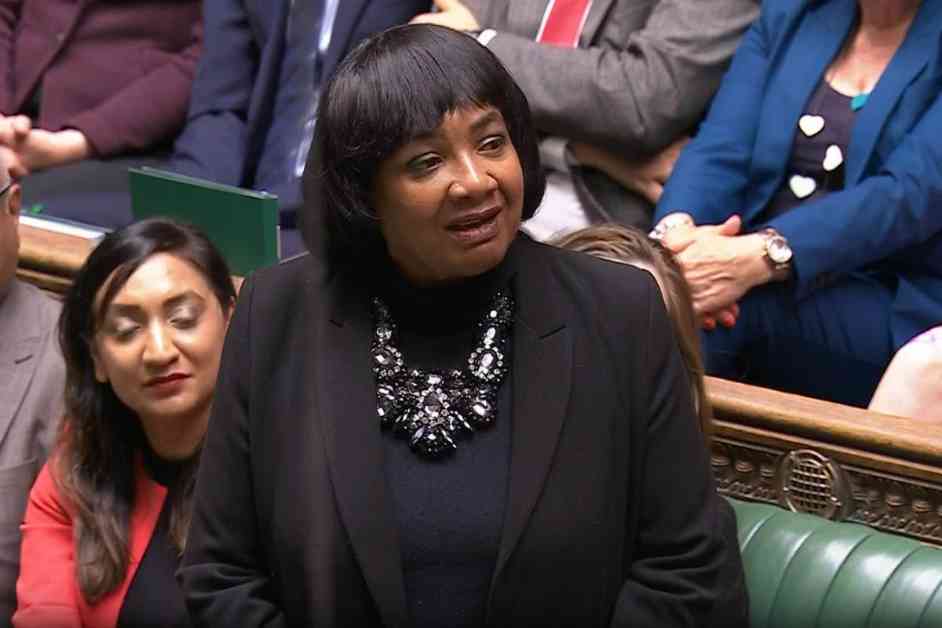Diane Abbott Accuses Peter Mandelson of Sabotaging Black MPs’ Success
In a shocking revelation, veteran Member of Parliament Diane Abbott has accused former Labour Party director of communications Peter Mandelson of deliberately sabotaging the success of black MPs within the party. In her memoir, “A Woman Like Me,” Abbott recounts a disturbing incident where Mandelson allegedly refused to provide her with media training ahead of a crucial appearance on BBC Question Time in 1986. Abbott, who was a parliamentary candidate at the time, claims that Mandelson’s lack of support and indifference towards her ultimately led to her feeling unprepared and vulnerable on national television.
Abbott’s Allegations Against Mandelson
According to Abbott’s account, she reached out to Mandelson four weeks before her scheduled appearance on BBC Question Time, requesting a media briefing to help her navigate the challenges of a televised debate. However, despite her repeated pleas and reminders, Mandelson failed to provide Abbott with the necessary support and guidance. As a result, Abbott found herself in a state of panic and anxiety on the day of the broadcast, feeling abandoned and unsupported by the very party she represented.
Abbott’s claims go beyond just a lack of media training; she suggests that Mandelson’s actions were part of a larger pattern of discrimination and marginalization against black candidates within the Labour Party. She alleges that senior party officials, including Mandelson, intentionally withheld resources and assistance from black MPs, effectively setting them up for failure. Abbott’s experience with Mandelson left her feeling disillusioned and betrayed by a party that she had devoted her life to serving.
Mandelson’s Denial and Response
In response to Abbott’s accusations, Peter Mandelson vehemently denied any wrongdoing, dismissing her claims as “insulting and absurd.” Mandelson asserted that his decision not to provide Abbott with media training was based on political considerations rather than her ethnicity. He emphasized that Abbott’s lack of support was not a reflection of her race but rather her political alignment with different factions within the party.
Mandelson’s denial only served to deepen the rift between him and Abbott, highlighting the deep-seated tensions and divisions within the Labour Party. Abbott’s allegations against Mandelson shed light on the challenges faced by black politicians in navigating a predominantly white and often hostile political landscape. Her experiences underscore the importance of representation and support for minority voices within political institutions.
Abbott’s Criticism of Neil Kinnock
In addition to her accusations against Peter Mandelson, Diane Abbott also takes aim at former Labour Party leader Neil Kinnock in her memoir. Abbott criticizes Kinnock for his dismissive attitude towards black MPs, portraying him as indifferent to their concerns and struggles. She alleges that Kinnock viewed black politicians as an embarrassment and failed to acknowledge their achievements and contributions to the party.
Abbott’s criticisms of Kinnock point to a broader issue of systemic racism and discrimination within the Labour Party, where black politicians are often marginalized and overlooked in favor of their white counterparts. Her experiences as a black MP shed light on the challenges and obstacles faced by minority politicians in gaining recognition and acceptance within the party hierarchy.
Implications for Black MPs in the Labour Party
Abbott’s revelations about her experiences as a black MP within the Labour Party raise important questions about representation, diversity, and inclusion in political institutions. Her story serves as a stark reminder of the barriers faced by minority politicians in accessing the same opportunities and resources as their white colleagues. Abbott’s allegations against Mandelson and Kinnock highlight the need for greater support and advocacy for black MPs within the party.
Moving forward, it is crucial for the Labour Party to address issues of systemic racism and discrimination within its ranks, ensuring that black politicians are given the same opportunities and support as their white counterparts. Abbott’s courage in speaking out against the injustices she faced serves as a rallying cry for greater accountability and transparency within the party. As the longest-serving black MP in Parliament, Abbott’s voice carries significant weight and influence in shaping the future of diversity and representation within the Labour Party.
Conclusion
Diane Abbott’s allegations against Peter Mandelson and Neil Kinnock shed light on the challenges faced by black MPs within the Labour Party. Her experiences highlight the systemic racism and discrimination that continue to plague political institutions, underscoring the need for greater support and advocacy for minority voices. Abbott’s courage and resilience in speaking out against injustice serve as a powerful reminder of the importance of representation and inclusion in shaping the future of British politics. As the Labour Party grapples with issues of diversity and equality, Abbott’s voice remains a beacon of hope and inspiration for black politicians striving to make their voices heard.












